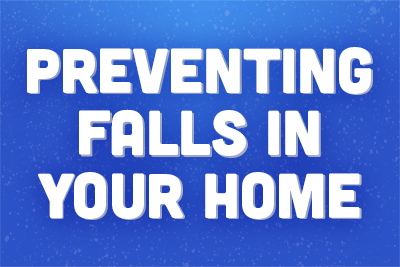
Remember when you were a child, how you were always running, jumping, skipping...and falling. Children fall all the time, but in most cases they get straight back up and carry on as if nothing has happened.
Unfortunately, as we grow older our bones become thinner and weaker and our reflexes are not what they were. Simple trips, slips and falls can be serious, resulting in painful bruising or even broken bones and long, inconvenient periods of recovery.
As with most things in life, prevention is best, and there is a lot we can do to minimize the risk of trips and falls at home. If loss of balance or episodes of dizziness become regular, you should seek advice from your doctor, but for most people, avoiding trips and falls is just a matter of a few simple precautions.
Some top tips :
- Mop up any spillages straight away, including wet floors if you come in from the rain. Try to avoid walking on any slippery surface with socks or tights
- Remove clutter from the floor, tidy away any trailing wires and replace frayed carpet. Pet toys are another common cause of trips and falls in the home
- Use only rugs and mats with non-slip backing on hard floor surfaces
- Use high wattage light bulbs or torches in darker areas, so you can see clearly
- Don't be afraid to ask for help in doing things that you can’t manage safely on your own
- Organize your home so that climbing, stretching and bending are kept to a minimum
- Avoid long loose-fitting or trailing clothes that could trip you up, especially on the stairs
- Wear shoes and slippers that fit well and are in good condition to avoid slipping or tripping. Footwear that has good ankle support is a good choice
- Take good care of your feet; people limping or hobbling on sore or painful feet are much more likely to trip
- Have a regular eye test, especially if you think your sight is getting worse. Poor eyesight increases your risk of a fall
- Take special care when getting up in the night to go to the bathroom, which can become more frequent as you get older. Make sure the route to the bathroom is well lit and free from clutter.
There is also strong evidence that regular physical activity improves strength and balance and reduces the risk of having a fall. Gentle exercise such a walking, dancing or swimming is beneficial, but there are also more specific strength exercises and balance exercises which can help. Many local community centers and gyms run exercise classes designed for older people and your local medical center or council should be able to help with advice on where to find them.
It’s always a good idea to consult your doctor before beginning an exercise regime and to start slowly and build up gradually.
Finally, there are various living aids which can be easily fitted to your home to make getting around easier and reduce your risk of a fall. These include hand rails, walkers, riser chairs and, of course, an Acorn Stairlift – since the one place where you really don’t want to trip or fall is on the stairs. Call us today at 1-866-873-6574 arrange your free, no-obligation home survey and quote!
Putting these simple precautions into place can be done quickly and with little disruption. An Acorn Stairlift can be installed in your home in just a few days. This applies to both straight and curved staircases and involves no major structural work, rewiring or redecoration.

